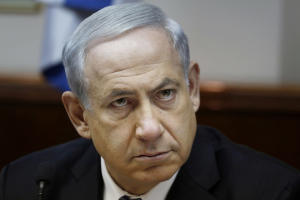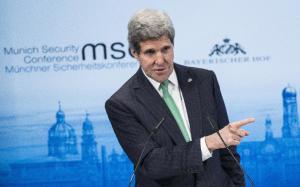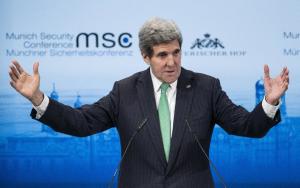Israeli Premier Rejects Kerry’s Boycott Warning- Aaron Heller and Moshe Edri
http://news.yahoo.com/israeli-premier-rejects-kerry-39-boycott-warning-112837984.html
JERUSALEM (AP) — Israeli Prime Minister Benjamin Netanyahu on Sunday rejected U.S. Secretary of State John Kerry’s warning against a growing boycott movement against the Jewish state should peace talks with the Palestinians fail, while some of his Cabinet ministers lashed out angrily, saying the stance undermined Israel’s legitimacy and the chances of reaching a peace agreement.
A small but growing number of European businesses and pension funds have begun to drop investments or limit trade with Israeli firms involved in the West Bank settlements. At a security conference in Germany this weekend, Kerry warned that a breakdown in Israeli-Palestinian talks would accelerate this trend and could threaten Israel’s economic prosperity and its safety.
“You see for Israel there’s an increasing de-legitimization campaign that has been building up. People are very sensitive to it. There are talk of boycotts and other kinds of things,” Kerry said. “Today’s status quo absolutely, to a certainty, I promise you 100 percent, cannot be maintained. It’s not sustainable. It’s illusionary. There’s a momentary prosperity, there’s a momentary peace.”
At the opening of his weekly Cabinet meeting, Netanyahu said international pressure on Israel would backfire and only cause the Palestinians to harden their positions.
“Attempts to impose a boycott on the State of Israel are immoral and unjust. Moreover, they will not achieve their goal,” he said.
While Netanyahu refrained from taking aim at Kerry, some of his ministers were more direct. Intelligence Minister Yuval Steinitz, of Netanyahu’s ruling Likud party, called Kerry’s comments “offensive, unfair and insufferable.”
“You can’t expect the state of Israel to conduct negotiations with a gun pointed to its head,” he said.
Economics Minister Naftali Bennett, from the religious, pro-settler Jewish Home party, said all “the advice givers” should know that Israel will not abandon its land because of economic threats.
“We expect our friends around the world to stand beside us, against anti-Semitic boycott efforts targeting Israel, and not for them to be their amplifier,” said Bennett, a fierce critic of the Kerry-led talks. “Only security will bring economic stability, he said.
Tzipi Livni, Israel’s chief negotiator, came to Kerry’s defense, saying he was merely expressing concern for Israel’s future.
Aiming to clarify, State Department spokeswoman Jen Psaki said Kerry’s only reference to a boycott was a description of actions undertaken by others that he has always opposed.
“Secretary Kerry has a proud record of over three decades of steadfast support for Israel’s security and well-being, including staunch opposition to boycotts,” she said in a statement. “Secretary Kerry has always expected opposition and difficult moments in the process, but he also expects all parties to accurately portray his record and statements.”
Over the past six months, Kerry has held endless back-and-forth talks with Israeli and Palestinian leaders in hopes of reaching a framework for a peace agreement. He is expected to present his ideas in the coming weeks and both sides have balked at some of his expected proposals.
Israeli nationalist leaders like Bennett, for instance, oppose a Palestinian state that is based on the pre-1967 borders. More than 500,000 settlers live in the West Bank and east Jerusalem, territories Israel captured in the 1967 war and which the Palestinians now hope will be part of their future state. Known to religious Jews as Judea and Samaria, they are parts of the biblical land of Israel and hard-liners object to ceding either area on both spiritual and security grounds. Any expected peace accord would put the fate of dozens of settlements at risk.
But European officials have warned that Israel could face deepening economic isolation if it presses forward with the construction of more settlements. In the latest example, Denmark’s largest bank, Danske Bank, blacklisted Israel’s Bank Hapoalim because of its links to settlement construction.
Once dismissed as a fringe issue, the boycott threat is now increasingly taking center stage in Israeli public debate.
Israeli Finance Minister Yair Lapid recently said that even in the case of a limited boycott that reduces Israeli exports to the European Union by 20 percent, the damage would amount to about 20 billion shekels ($5.7 billion) in exports annually.
In a related development, Lapid also ordered that all payments to settlements be stopped until their use is clarified. The move followed a TV report that said funds were allegedly being illegally transferred to the Yesha Council — an umbrella groups of settlers — that was illicitly using the money for political purposes.
____
Associated Press Writer David Rising contributed to this report from Munich, Germany.
Comments are closed.



